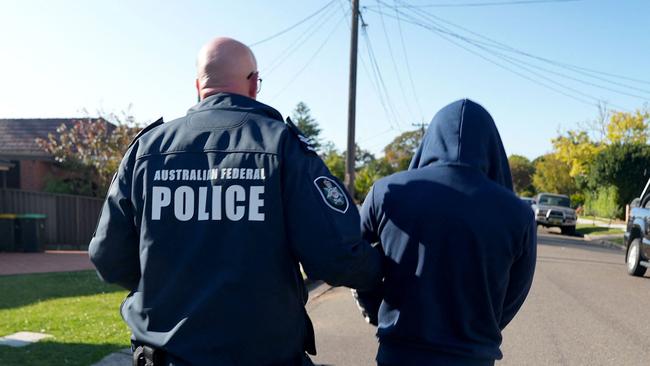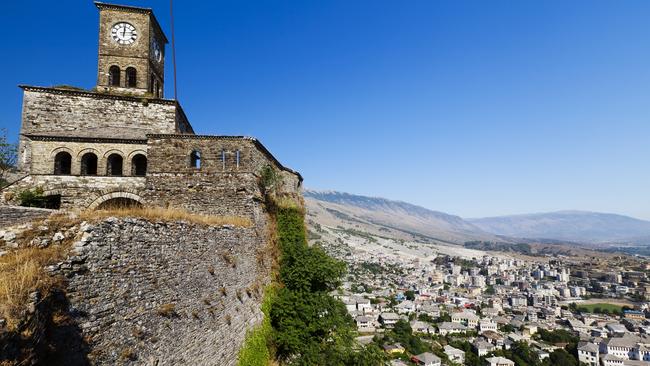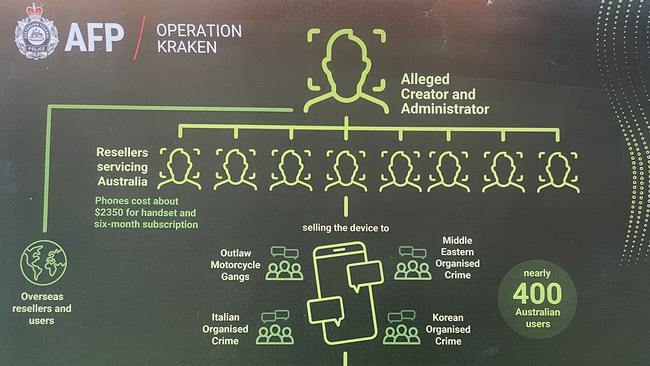
Earlier this week, in a blaze of flash bangs and heavily armed men in black pyjamas surging into buildings, a series of arrests were made that will change the criminal landscape in Australia.
At the top of the arrests is a 32-year-old man, Jay Je Yoon Jung who police allege created an encrypted messaging platform designed as a communication service specifically for transnational crime syndicates, known as the Ghost App.
The following day, NSW Police made six significant arrests of men who the cops allege are the major distributors of cocaine in Sydney. Police claim the six men are key figures in what is known in the underworld as the Commission and sold more than 1.2 million tonnes of cocaine into Sydney in just four months this year alone. The Commission, police believe, set the price and control the supply of cocaine in Australia.
It was outstanding investigative work from both the AFP and the NSW Police. The operation to join, surveil and ultimately switch off the Ghost app was especially impressive, a long haul of technological interference and surveillance of some of the world’s most dangerous criminals.
The question is, what or more importantly who comes next? Who will replace the loose-lipped and loose-fingered crooks who have telegraphed their activities?
One group with a substantial foothold in Australia and a significant role in global drug traffic already is bound to step up. The Albanian Mafia with its amorphous gangs based on family and blood ties much like the Italian Mafioso, have become a powerhouse in global organised crime.
Albania is a narcostate. For the most part, the former communist hermit state has become a major port and distribution centre for an estimated 80 per cent of Europe’s cocaine.
The Calabrian Mafia, ‘Ndrangheta has had its wings clipped through a recent supertrial in Italy but it remains a force and has called upon the Albanian Mafia to take up the slack. This has changed the power balance between the two groups.

The relationship between the two remains close and while the Calabrians have been subject to restraint, the Albanians have shifted from foot soldiers to cartel bosses.
The Sicilian Mafia, La Cosa Nostra, now in decline, has largely been supplanted in the US by the Albanians who use the old LCN networks to distribute cocaine, fentanyl and heroin in the US.
There are more than 40000 Australians of Albanian heritage in the country. Immigration from the Balkan Peninsula has been going on for 150 years and many Albanians have made fine contributions to this country.
It is some of the more recent arrivals that are of concern. These Albanians with links to criminal syndicates arrive in Australia, often with false documentation, seek asylum or protection and commit serious criminal offences while their applications are reviewed by immigration authorities. In the event of a deportation order, the applicant can appeal to the Administrative Appeals Tribunal.
Applicants often fail to appear at hearings, extending the process which can run to five or six years before being deported. In the meanwhile, these individuals start by operating cannabis grow houses and with some black cash under their belts, begin supplying cocaine and a raft of other dangerous drugs.
The Albanian crime groups are known to be brutal. In the US, for example, La Cosa Nostra often used their Albanian cohorts as muscle due to their propensity for extreme violence.
A few weeks ago, I met with an English criminal barrister who told me about the difficulties in representing Albanian crime gang members in court. One such client had been charged with the bludgeoning murder of another Albanian gang member at a nightclub in Canary Wharf in London’s east.
There had been a confrontation and the KC’s client had left the club only to return with a metal pipe. This was established by CCTV footage.
The KC told me, “Now, I can explain that.”
There was further evidence that after beating his victim to death, the offender had put the metal pipe in his inside jacket pocket before leaving the club. While the murder weapon was never found, blood from the deceased was found on the accused’s jacket.
The KC said, “I could explain that, too.”

But his client was having none of it. He pleaded guilty, not as part of a plea deal or for some form of sentence reduction. The Albanian man accepted 27 years on the roof, as we say in Australia, without blinking.
It was some weeks afterwards the KC discovered the real reasons his considerable talents as an advocate were not brought to bear at trial. Had the Albanian murderer pleaded not guilty or sought some plea deal, it would have set off a blood feud between the two families. One foul murder would have led to perhaps a dozen more – parents, children, siblings – all would have been targets.
The behaviour differs markedly to what one Australian fellow with lengthy criminal antecedents claims is the case with organised syndicates of Middle Eastern heritage. This old crook believes that when police grab one gang member, they have got them all in custody three days later. The inference is that what La Cosa Nostra refers to as ‘Omerta’ or silence is an unknown concept among Middle Eastern crime figures.
It may or may not be true but what the KC learned at first hand is that members of Albanian crime syndicates have no fear of police or legal consequences.
One thing is certain, in a cocaine market with an annualised consumption of more than 3.6 tonnes and a street value of more than $5 billion, new players will soon come to fill the vacuum at the top.
The reality is the new crime bosses may be a lot worse than those recently led away in handcuffs.
This game never ends.


